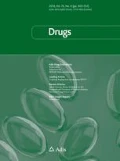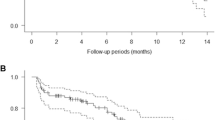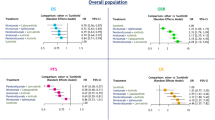Abstract
Although antiangiogenic treatments have produced milestone advances in the treatment of several diseases, and have significantly extended the median survival of cancer patients, these agents share some weaknesses, including a limited impact on the overall cure rate, a fleeting effect because of redundant pathways or early appearance of resistance mechanisms, and the lack of predictive factors for treatment selection. Recent data suggest that antibodies targeting the vascular endothelial growth factor axis exert their activity through the inhibition of vascular endothelial growth factor receptor-2 phosphorylation, which has a pivotal role in the neoangiogenic process. Ramucirumab, a fully humanized monoclonal antibody specifically directed against the extracellular domain of the receptor, administered intravenously every 2 or 3 weeks, is emerging as a novel antiangiogenic opportunity. Starting with preclinical data and early clinical results, this concise review focuses on the development of the novel compound across multiple cancers (including gastrointestinal malignancies, breast cancer, lung carcinoma, and genitourinary tumors), and presents available data from randomized phase II and phase III trials. REGARD was the first phase III study to report on the efficacy of single-agent ramucirumab in patients with advanced cancer. Many other ongoing phase III trials are testing the efficacy of this interesting antiangiogenic compound as a single agent or in combination with chemotherapy in different cancer types.

Similar content being viewed by others
References
Cook KM, Figg WD. Angiogenesis inhibitors: current strategies and future prospects. CA Cancer J Clin. 2010;60:222–43.
Jain RK. Normalization of tumor vasculature: an emerging concept in antiangiogenic therapy. Science. 2005;307:58–62.
Ferrara N. Binding to the extracellular matrix and proteolytic processing: two key mechanisms regulating vascular endothelial growth factor action. Mol Biol Cell. 2010;21:687–90.
Shibuya M. Vascular endothelial growth factor (VEGF) and its receptor (VEGFR) signaling in angiogenesis: a crucial target for anti- and pro-angiogenic therapies. Genes Cancer. 2011;2:1097–105.
Hicklin DJ, Ellis LM. Role of the vascular endothelial growth factor pathway in tumor growth and angiogenesis. J Clin Oncol. 2005;23:1011–27.
Lanahan A, Zhang X, Fantin A, et al. The neuropilin 1 cytoplasmic domain is required for VEGF-A-dependent arteriogenesis. Dev Cell. 2013;25:156–68.
Van Cutsem E, De Haas S, Kang Y-K, et al. Bevacizumab in combination with chemotherapy as first-line therapy in advanced gastric cancer: a biomarker evaluation from the AVAGAST randomized phase III trial. J Clin Oncol. 2012;30:2119–27.
Staton CA, Brown NJ, Reed MW. Current status and future prospects for anti-angiogenic therapies in cancer. Expert Opin Drug Discov. 2009;4:961–79.
Hurwitz H, Fehrenbacher L, Novotny W, et al. Bevacizumab plus irinotecan, fluorouracil, and leucovorin for metastatic colorectal cancer. N Engl J Med. 2004;350:2335–42.
Sandler A, Gray R, Perry MC, et al. Paclitaxel-carboplatin alone or with bevacizumab for non-small-cell lung cancer. N Engl J Med. 2006;355:2542–50.
Miller K, Wang M, Gralow J, et al. Paclitaxel plus bevacizumab versus paclitaxel alone for metastatic breast cancer. N Engl J Med. 2007;357:2666–76.
Escudier B, Pluzanska A, Koralewski P, et al. Bevacizumab plus interferon alfa-2a for treatment of metastatic renal cell carcinoma: a randomised, double-blind phase III trial. Lancet. 2007;370:2103–11.
Kreisl TN, Kim L, Moore K, et al. Phase II trial of single-agent bevacizumab followed by bevacizumab plus irinotecan at tumor progression in recurrent glioblastoma. J Clin Oncol. 2009;27:740–5.
Van Cutsem E, Tabernero J, Lakomy R, et al. Addition of aflibercept to fluorouracil, leucovorin, and irinotecan improves survival in a phase III randomized trial in patients with metastatic colorectal cancer previously treated with an oxaliplatin-based regimen. J Clin Oncol. 2012;30:3499–506.
Gan HK, Seruga B, Knox JJ. Sunitinib in solid tumors. Expert Opin Investig Drugs. 2009;18:821–34.
Wilhelm SM, Adnane L, Newell P, et al. Preclinical overview of sorafenib, a multikinase inhibitor that targets both Raf and VEGF and PDGF receptor tyrosine kinase signaling. Mol Cancer Ther. 2008;7:3129–40.
Motzer RJ, Hutson TE, Tomczak P, et al. Sunitinib versus interferon alfa in metastatic renal-cell carcinoma. N Engl J Med. 2007;356:115–24.
Llovet JM, Ricci S, Mazzaferro V, et al. Sorafenib in advanced hepatocellular carcinoma. N Engl J Med. 2008;359:378–90.
Demetri GD, Van Oosterom AT, Garrett CR, et al. Efficacy and safety of sunitinib in patients with advanced gastrointestinal stromal tumour after failure of imatinib: a randomised controlled trial. Lancet. 2006;368:1329–38.
Finn RS, Kang Y-K, Mulcahy M, et al. Phase II, open-label study of brivanib as second-line therapy in patients with advanced hepatocellular carcinoma. Clin Cancer Res. 2012;18:2090–8.
Lee JS, Hirsh V, Park K, et al. Vandetanib versus placebo in patients with advanced non-small-cell lung cancer after prior therapy with an epidermal growth factor receptor tyrosine kinase inhibitor: a randomized, double-blind phase III trial (ZEPHYR). J Clin Oncol. 2012;30:1114–21.
Sequist LV, Muzikansky A, Engelman JA. A new BATTLE in the evolving war on cancer. Cancer Discov. 2011;1:14–6.
Rolfo C, Raez LE, Bronte G, et al. BIBF 1120/ nintedanib : a new triple angiokinase inhibitor-directed therapy in patients with non-small cell lung cancer. Expert Opin Investig Drugs. 2013;22:1081–8.
Grothey A, Van Cutsem E, Sobrero A, et al. Regorafenib monotherapy for previously treated metastatic colorectal cancer (CORRECT): an international, multicentre, randomised, placebo-controlled, phase 3 trial. Lancet. 2013;381:303–12.
Demetri GD, Reichardt P, Kang Y-K, et al. Efficacy and safety of regorafenib for advanced gastrointestinal stromal tumours after failure of imatinib and sunitinib (GRID): an international, multicentre, randomised, placebo-controlled, phase 3 trial. Lancet. 2013;381:295–302.
Aprile G, Macerelli M, Giuliani F. Regorafenib for gastrointestinal malignancies: from preclinical data to clinical results of a novel multi-target inhibitor. BioDrugs. 2013;27:213–24.
Wedge SR, Kendrew J, Hennequin LF, et al. AZD2171: a highly potent, orally bioavailable, vascular endothelial growth factor receptor-2 tyrosine kinase inhibitor for the treatment of cancer. Cancer Res. 2005;65:4389–400.
Hoff PM, Hochhaus A, Pestalozzi BC, et al. Cediranib plus FOLFOX/CAPOX versus placebo plus FOLFOX/CAPOX in patients with previously untreated metastatic colorectal cancer: a randomized, double-blind, phase III study (HORIZON II). J Clin Oncol. 2012;30:3596–603.
Schmoll H-J, Cunningham D, Sobrero A, et al. Cediranib with mFOLFOX6 versus bevacizumab with mFOLFOX6 as first-line treatment for patients with advanced colorectal cancer: a double-blind, randomized phase III study (HORIZON III). J Clin Oncol. 2012;30:3588–95.
Tian S, Quan H, Xie C, et al. YN968D1 is a novel and selective inhibitor of vascular endothelial growth factor receptor-2 tyrosine kinase with potent activity in vitro and in vivo. Cancer Sci. 2011;102:1374–80.
Langer CJ, Mok T, Postmus PE. Targeted agents in the third-/fourth-line treatment of patients with advanced (stage III/IV) non-small cell lung cancer (NSCLC). Cancer Treat Rev. 2013;39:252–60.
Sternberg C, Davis ID, Mardiak J, et al. Pazopanib in locally advanced or metastatic renal cell carcinoma: results of a randomized phase III trial. J Clin Oncol. 2010;28:1061–8.
Van der Graaf WT, Blay JY, Chawla SP, et al. Pazopanib for metastatic soft-tissue sarcoma (PALETTE): a randomised, double-blind, placebo-controlled phase 3 trial. Lancet. 2012;379:1879–86.
Motzer RJ, Escudier B, Tomczak P, et al. Axitinib versus sorafenib as second-line treatment for advanced renal cell carcinoma: overall survival analysis and updated results from a randomised phase 3 trial. Lancet Oncol. 2013;14:552–62.
Kerbel RS. Tumor angiogenesis. N Engl J Med. 2008;358:2039–49.
Ferrara N. Vascular endothelial growth factor as a target for anticancer therapy. Oncologist. 2004;9:2–10.
Holmes K, Roberts OL, Thomas AM, et al. Vascular endothelial growth factor receptor-2: structure, function, intracellular signalling and therapeutic inhibition. Cell Signal. 2007;19:2003–12.
Weis SM, Cheresh DA. Tumor angiogenesis: molecular pathways and therapeutic targets. Nat Med. 2011;17:1359–70.
Melisi D, Piro D, Tamburrino A, et al. Rationale and clinical use of multitargeting anticancer agents. Curr Opin Pharmacol. 2013;13:536–42.
Youssoufian H, Hicklin DJ, Rowinsky EK. Review: monoclonal antibodies to the vascular endothelial growth factor receptor-2 in cancer therapy. Clin Cancer Res. 2007;13:5544s–8s.
Spratlin JL, Mulder KE, Mackey JR. Ramucirumab (IMC-1121B): a novel attack on angiogenesis. Future Oncol. 2010;6:1085–94.
Clarke JM, Hurvitz HI. Targeted inhibition of VEGFR receptor 2: an update on ramucirumab. Expert Opin Biol Ther. 2013;13:1–10.
Dantas-Barbosa C, De Macedo Brigido M, et al. Antibody phage display libraries: contributions to oncology. Int J Mol Sci. 2012;13:5420–40.
Lu D, Shen J, Vil MD, et al. Tailoring in vitro selection for a picomolar affinity human antibody directed against vascular endothelial growth factor receptor 2 for enhanced neutralizing activity. J Biol Chem. 2003;278:43496–507.
Lu D, Jimenez X, Zhang H, et al. Selection of high affinity human neutralizing antibodies to VEGFR2 from a large antibody phage display library for antiangiogenesis therapy. Int J Cancer. 2002;97:393–9.
Franklin MC, Navarro EC, Wang Y, et al. The structural basis for the function of two anti-VEGF receptor 2 antibodies. Structure. 2011;19:1097–107.
Miao H-Q, Hu K, Jimenez X, et al. Potent neutralization of VEGF biological activities with a fully human antibody Fab fragment directed against VEGF receptor 2. Biochem Biophys Res Commun. 2006;345:438–45.
Prewett M, Huber J, Li Y, et al. Antivascular endothelial growth factor receptor (fetal liver kinase 1) monoclonal antibody inhibits tumor angiogenesis and growth of several mouse and human tumors. Cancer Res. 1999;59:5209–18.
Spratlin JL, Cohen RB, Eadens M, et al. Phase I pharmacologic and biologic study of ramucirumab (IMC-1121B), a fully human immunoglobulin G1 monoclonal antibody targeting the vascular endothelial growth factor receptor-2. J Clin Oncol. 2010;28:780–7.
Fong GH, Rossant J, Gertsenstein M, et al. Role of the Flt-1 receptor tyrosine kinase in regulating the assembly of vascular endothelium. Nature. 1995;376:66–70.
Zhu Z, Hattori K, Zhang H, et al. Inhibition of human leukemia in an animal model with human antibodies directed against vascular endothelial growth factor receptor 2. Correlation between antibody affinity and biological activity. Leukemia. 2003;17:604–11.
Wadhwa R, Taketa T, Sudo K, et al. Ramucirumab: a novel antiangiogenic agent. Future Oncol. 2013;9:789–95.
Chiorean EG, Sweeney C, Hurwitz H, et al. Phase 1 dose-escalation study of the anti- VEGFR-2 recombinant Human IgG1 MAb IMC-1121B administered every other week (q2w) or every 3 weeks (q3w) in patients (pts) with advanced cancers [abstract no. B15]. AACR-NCI-EORTC international congress; 2007.
Fuchs CS, Tomasek J, Yong CJ, et al. Ramucirumab monotherapy for previously treated advanced gastric or gastro-oesophageal junction adenocarcinoma (REGARD): an international, randomised, multicentre, placebo-controlled, phase 3 trial. Lancet. 2013. doi:10.1016/S0140-6736(13)61719-5.
Tabernero J, Tomasek J, Filip D, et al. REGARD phase 3, randomized trial of ramucirumab in patients with metastatic gastric or GEJ adenocarcinoma following progression on first-line chemotherapy [abstract no. O-0008]. 15th world congress on gastrointestinal cancer, ESMO; 2013.
Eli Lilly and Company. A Study of Paclitaxel With or Without Ramucirumab in Metastatic Gastric Adenocarcinoma (RAINBOW). [ClinicalTrials.gov identifier NCT01170663] US National Institutes of Health, clinicaltrials.gov; 2013. http://clinicaltrials.gov/ct2/show/NCT01170663?term=ramucirumab&rank=4. (Accessed 30 Oct 2013).
Eli Lilly and Company. Randomized, placebo-controlled, double-blind phase 2 study of mFOLFOX6 chemotherapy plus ramucirumab drug product (IMC-1121B) versus m FOLFOX6 plus placebo for advanced adenocarcinoma of the esophagus, gastroesophageal junction or stomach.). [ClinicalTrials.gov identifier NCT01246960] US National Institutes of Health, clinicaltrials.gov; 2013. http://clinicaltrials.gov/ct2/show/NCT01246960?term=ramucirumab&rank=10. (Accessed 30 Oct 2013).
Sia D, Villanueva A. Signaling pathways in hepatocellular carcinoma. Oncology. 2011;81(Suppl 1):18–23.
Frenette C, Gish R. Targeted systemic therapies for hepatocellular carcinoma: clinical perspectives, challenges and implications. World J Gastroenterol. 2012;18:498–506.
Eli Lilly and Company. A Study of Ramucirumab (IMC-1121B) Drug Product (DP) and Best Supportive Care (BSC) Versus Placebo and BSC as 2nd-Line Treatment in Patients With Hepatocellular Carcinoma After 1st-Line Therapy With Sorafenib (REACH). [ClinicalTrials.gov identifier NCT01140347] US National Institutes of Health, clinicaltrials.gov; 2013. http://clinicaltrials.gov/ct2/show/NCT01140347?term=ramucirumab&rank=9 (Accessed 30 Oct 2013).
Eli Lilly and Company. Study of IMC-1121B (Ramucirumab) in Patients With Liver Cancer Who Have Not Previously Been Treated With Chemotherapy. [ClinicalTrials.gov identifier NCT00627042] US National Institutes of Health, clinicaltrials.gov; 2013. http://clinicaltrials.gov/ct2/show/NCT00627042?term=ramucirumab&rank=14 (Accessed 30 Oct 2013).
Garcia-Carbonero R, Rivera F, Maurel J, et al. A phase II, open-label study evaluating the safety and efficacy of ramucirumab combined with mFOLFOX-6 as first-line therapy in patients (pts) with metastatic colorectal cancer (mCRC): CP12-0709/NCT00862784 [abstract no.533]. J Clin Oncol. 2012;30(suppl. 4).
Eli Lilly and Company. A randomized, double-blind, multicenter, phase 3 study of irinotecan, folinic acid, and 5-Fluorouracil (FOLFIRI) plus ramucirumab or placebo in patients with metastatic colorectal cancer progressive during or following first-line combination therapy with bevacizumab, oxaliplatin, and a fluoropyrimidine (RAISE). [ClinicalTrials.gov identifier NCT01183780] US National Institutes of Health, clinicaltrials.gov; 2013. http://clinicaltrials.gov/ct2/show/NCT01183780?term=ramucirumab&rank=17 (Accessed 30 Oct 2013).
Vahdat LT, Miller K, Sparano JA, et al. Randomized phase II study of capecitabine with or without ramucirumab (IMC-1121B) or IMC-18F1 in patients with unresectable, locally advanced or metastatic breast cancer (mBC) previously treated with anthracycline and taxane therapy (CP20-0903/NCT01234402) [abstract no. TPS151]. J Clin Oncol. 2011;29.
ImClone LLC. Study of IMC-18F1 or Ramucirumab DP in Combination With Capecitabine or Capecitabine on Previously Treated Breast Cancer Patients. [ClinicalTrials.gov identifier NCT01234402] US National Institutes of Health, clinicaltrials.gov. 2013. http://clinicaltrials.gov/ct2/show/NCT01234402?term=ramucirumab&rank=8 (Accessed 30 Oct 2013).
Eli Lilly and Company. An open-label, multicenter, randomized, phase 2 study evaluating the efficacy and safety of ramucirumab (IMC-1121b) drug product in combination with eribulin versus eribulin monotherapy in unresectable, locally-recurrent or metastatic breast cancer patients. [ClinicalTrials.gov identifier NCT01427933] US National Institutes of Health, clinicaltrials.gov; 2013. http://clinicaltrials.gov/ct2/show/NCT01427933?term=ramucirumab&rank=11 (Accessed 30 Oct 2013).
Miller K, Wang M, Gralow J, et al. Paclitaxel plus bevacizumab versus paclitaxel alone for metastatic breast cancer. N Engl J Med. 2007;357(26):2666–76.
Miles DW, Chan A, Dirix LY, et al. Phase III study of bevacizumab plus docetaxel compared with placebo plus docetaxel for the first-line treatment of human epidermal growth factor receptor 2-negative metastatic breast cancer. J Clin Oncol. 2010;28:3239–47.
Mackey J, Gelmon K, Martin M, et al. TRIO-012: a multicenter, multinational, randomized, double-blind phase III study of IMC-1121B plus docetaxel versus placebo plus docetaxel in previously untreated patients with HER2-negative, unresectable, locally recurrent or metastatic breast cancer. Clin Breast Cancer. 2009;9:258–61.
Camidge DR, Ballas MS, Dubey S, et al. A phase II, open-label study of ramucirumab (IMC-1121B), an IgG1 fully human monoclonal antibody (MAb) targeting VEGFR-2, in combination with paclitaxel and carboplatin as first-line therapy in patients (pts) with stage IIIb/IV non-small cell lung cancer (NSCLC) [abstract no. 7588]. J Clin Oncol. 2010;28(Suppl. 15).
Doebele R, Spigel D, Tehfe M, et al. A phase II randomized open-label study of Ramucirumab (IMC 1121B; RAM) in combination with platinum-based chemotherapy in patients (pts) with recurrent or advanced non-small cell lung cancer (NSCLC): results from non-squamous (NSQ) pts (NCT01160744) [abstract no. 1400]. 37th ESMO congress; ESMO; 2012.
Garon EB, Cao D, Alexandris E, et al. A randomized, double-blind, phase III study of docetaxel and ramucirumab versus docetaxel and placebo in the treatment of stage IV non-small-cell lung cancer after disease progression after 1 previous platinum-based therapy (REVEL): treatment rationale and study design. Clin Lung Cancer. 2012;13:505–9.
Garcia JA, Hudes JR, Choueiri TK, et al. Phase II study of IMC-1121B in patients with metastatic renal cancer (mRCC) following VEGFR-2 tyrosine kinase inhibitor (TKI) therapy (IMCL CP12-0605/NCT00515697) [abstract no. 326]. Genitourinary cancers symposium; 2010.
Eli Lilly and Company. Study of Ramucirumab or IMC-18F1 With Docetaxel or Docetaxel Alone as Second-Line Therapy in Participants With Bladder,Urethra, Ureter, or Renal Pelvis Carcinoma [ClinicalTrials.gov identifier NCT01282463] US National Institutes of Health, clinicaltrials.gov; 2013. http://clinicaltrials.gov/ct2/show/NCT01282463?term=ramucirumab&rank=12. (Accessed 30 Oct 2013).
Penson RT, Moore KN, Fleming GF, et al. A phase II, open-label, multicenter study of IMC-1121B (ramucirumab; RAM) monotherapy in the treatment of persistent or recurrent epithelial ovarian (EOC), fallopian tube (FTC), or primary peritoneal (PPC) carcinoma (CP12-0711/NCT00721162) [abstract no.5012]. J Clin Oncol. 2012;30.
Hussain M, Rathkopf DE, Liu G, et al. A phase II randomized study of cixutumumab (IMC-A12: CIX) or ramucirumab (IMC 1121B: RAM) plus mitoxantrone (M) and prednisone (P) in patients (pts) with metastatic castrate-resistant prostate cancer (mCRPC) following disease progression (PD) on docetaxel (DCT) therapy [abstract no. 8519].). J Clin Oncol. 2012;30(Suppl. 15).
Carvajal RD, Wong MK, Thomson JA, et al. A phase II randomized study of ramucirumab (IMC-1121B) with or without dacarbazine (DTIC) in patients (pts) with metastatic melanoma (MM) [abstract no.8519]. J Clin Oncol. 2010;28(Suppl. 15).
Friedman HS, Prados MD, Wen PY, et al. Bevacizumab alone and in combination with irinotecan in recurrent glioblastoma. J Clin Oncol. 2009;27:4733–40.
Chi AS, Chamberlain MC. Is there a role for bevacizumab in the treatment of glioblastoma? Oncologist. 2013;18:1080–2.
Sidney Kimmel Comprehensive Cancer Center. Ramucirumab or Anti-PDGFR Alpha Monoclonal Antibody IMC-3G3 in Treating Patients With Recurrent Glioblastoma Multiforme. [ClinicalTrials.gov identifier NCT00895180] US National Institutes of Health, clinicaltrials.gov; 2013. http://clinicaltrials.gov/ct2/show/NCT00895180?term=ramucirumab&rank=27 (Accessed 30 Oct 2013).
Leppänen VM, Jeltsch M, Anisimov A, et al. Structural determinants of vascular endothelial growth factor-D receptor binding and specificity. Blood. 2011;117:1507–15.
Ford H, Marshall A, Wadsley J et al. Cougar-02: a randomized Phase III study of docetaxel versus active symptom control in advanced esophagogastric adenocarcinoma [abstract LBA4]. J Clin Oncol. 2012;30(Suppl. 34).
Thuss-Patience PC, Kretzschmar A, Bichev D, et al. Survival advantage for irinotecan versus best supportive care as second-line chemotherapy in gastric cancer—a randomised phase III study of the Arbeitsgemeinschaft Internistische Onkologie (AIO). Eur J Cancer. 2011;47:2306–14.
Kang JH, Lee S II, Lim DH, et al. Salvage chemotherapy for pretreated gastric cancer: a randomized Phase III trial comparing chemotherapy plus best supportive care with best supportive care alone. J Clin Oncol. 2012;30:1513–8.
Conflict of interest
None of the authors have competing interests to disclose and no funding or editorial help was received in support of this manuscript. All authors approved the final version of the manuscript. Dr. Giuseppe Aprile was involved in the REGARD trial as clinical investigator. He has received consultancy and speaker’s honoraria from Roche, Eli-Lilly, Amgen, and Merck-Serono. Dr. Carmelo Pozzo has received consultancy honoraria from Eli-Lilly. Dr. Francesco Giuliani has been an invited speaker for Roche, Amgen, Merck-Serono, and Sanofi-Aventis. Dr. Marta Bonotto and Dr. Elena Ongaro have no financial interests to disclose.
Author information
Authors and Affiliations
Corresponding author
Rights and permissions
About this article
Cite this article
Aprile, G., Bonotto, M., Ongaro, E. et al. Critical Appraisal of Ramucirumab (IMC-1121B) for Cancer Treatment: From Benchside to Clinical Use. Drugs 73, 2003–2015 (2013). https://doi.org/10.1007/s40265-013-0154-8
Published:
Issue Date:
DOI: https://doi.org/10.1007/s40265-013-0154-8




